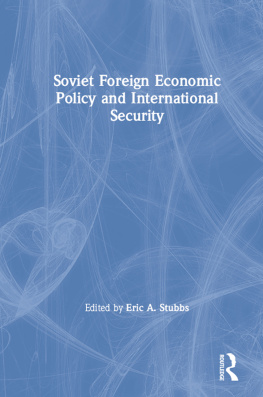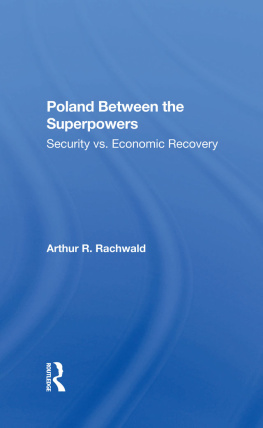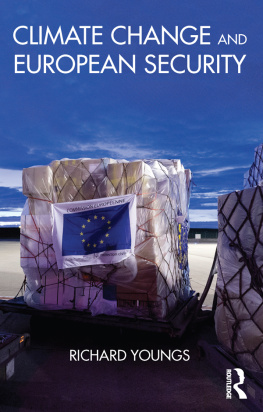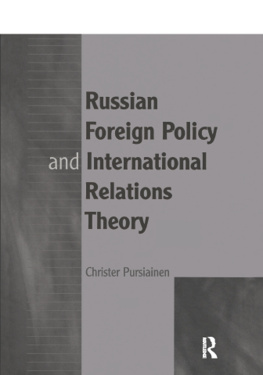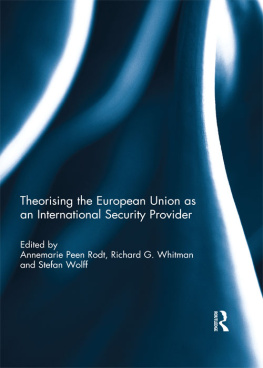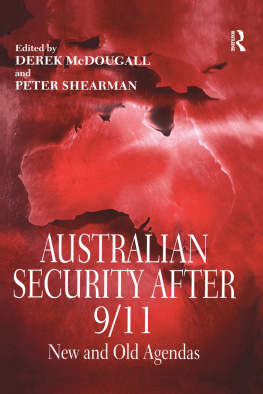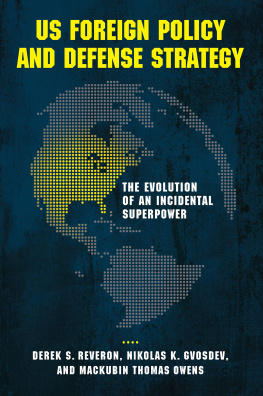First published 1991 by M.E. Sharpe
Published 2015 by Routledge
2 Park Square, Milton Park, Abingdon, Oxon OX14 4RN
711 Third Avenue, New York, NY 10017, USA
Routledge is an imprint of the Taylor & Francis Group, an informa business
Copyright 1991 Taylor & Francis. All rights reserved.
No part of this book may be reprinted or reproduced or utilised in any form or by any electronic, mechanical, or other means, now known or hereafter invented, including photocopying and recording, or in any information storage or retrieval system, without permission in writing from the publishers.
Notices
No responsibility is assumed by the publisher for any injury and/or damage to persons or property as a matter of products liability, negligence or otherwise, or from any use of operation of any methods, products, instructions or ideas contained in the material herein.
Practitioners and researchers must always rely on their own experience and knowledge in evaluating and using any information, methods, compounds, or experiments described herein. In using such information or methods they should be mindful of their own safety and the safety of others, including parties for whom they have a professional responsibility.
Product or corporate names may be trademarks or registered trademarks, and are used only for identification and explanation without intent to infringe.
Library of Congress Cataloging-in-Publication Data
Soviet foreign economic policy and international security edited by Eric A. Stubbs.
p. cm.
Includes revisions of papers presented at a conference sponsored by the Center for Foreign Policy Development at Brown University held in December 1988.
Includes bibliographical references and index.
ISBN 0-87332-666-0 (cloth)
1. Soviet UnionForeign economic relationsCongresses.
2. International economic relationsCongresses.
3. Commercial policyCongresses.
I. Stubbs, Eric A.
II. Brown University.
Center for Foreign Policy Development.
HF1558.S68 1991
337.47dc20
91-7458
CIP
ISBN 13: 9780873326667 (hbk)
A conference volume such as this depends on the combined efforts of many individuals. The road to publication of this volume began with the Center for Foreign Policy Development conference on Superpower Commerce in December of 1988, and the contributions of time, effort, and the energetic exchange of ideas by the presenters and the attendees. Many of those original papers have been revised and updated, and, coupled with the contributions of our other authors, now appear in this book. The staff of the Center played a dual role in the realization of this project, offering both creative and administrative support. Mark Garrison, Director of the Center, and Alan Sherr, Associate Director, and former research associates Christine Westbrook, Kenneth Coughlin, and Douglas Seay pored over the manuscripts at their various stages of literary evolution and offered numerous valuable suggestions that strengthened the book in many ways. Discussions with our external referees, particularly James Hecht and the economics faculty of the United States Military Academy at West Point, generated important insights too that have been incorporated into various chapters of the book. No recounting of the contributions of the many participants in this project could be complete, however, without recognizing the efforts and creative contributions of the Centers Publications Editor, Lorraine Walsh. Without Lorraines editorial input, diplomacy, and stewardship of the manuscript, this book would never have been more than a twinkle in the eyes of its authors.
Eric A. Stubbs
Stony Brook, NY
April 1991
Eric A. Stubbs
It would have been impossible only six years ago to predict the kinds of changes in U.S.-Soviet relations and in Eastern Europe that we have witnessed since 1985. Charges that the Soviet Union was an evil empire and countercharges of U.S. imperialistic aggression have given way to an emerging coexistence that is far more sober if not yet entirely comfortable or reliable. These changes have provided the impetus for the most profound reassessment of U.S. political and commercial relations with the Soviet Union since the end of World War II. Yet, despite the motivation, our current understanding of U.S. and Soviet interests and our notions of the relationship we hope to build remain incomplete.
In December 1988, the Center for Foreign Policy Development at Brown University sponsored a conference to examine the economic and national security implications of U.S.-Soviet commercial relations. Superpower Commerce: Economic Relations with the USSR and U.S. National Interests brought together scholars, business leaders, and government officials from the United States, Canada, and Europe to wrestle with the complex issues of U.S. interests in Soviet reform, the impact of the Soviet Union on U.S. commercial and diplomatic relations with Western Europe, the balance between U.S. commercial and security concerns, and the changing definition of security itself. The issues were explored through the presentation of papers and sometimes spirited debates that highlighted the different positions that could be defended with apparently equal skill and conviction.
This volume is a product of that conference. Papers by Jonathan Coopersmith and Paul Josephson, Michael Lucas, Steven Rosefielde, Catherine Sokil, and John Tedstrom originally presented at that conference have been revised and updated for this volume. These have been supplemented with new contributions by Kurt Maksad and Lawrence Modisett.
The complexity of the myriad issues surrounding U.S.-Soviet commercial relations and their economic and political implications defies adequate treatment in any one volume. While an attempt is made here to survey the terrain more broadly, the focus remains on a narrower set of questions. The first section asks what the history of U.S.-Soviet trade relations tells us about the linkage between commerce and politics. The second section examines the implications of Soviet economic reform for the emergence of the Soviet Union as an important participant in the Western commercial economy. The third section considers the role of export controls and technology transfer in U.S.-European relations and what we might learn from recent experiences with respect to export control regimes.
The rapidity with which relations have evolved in recent years has created a dilemma for the U.S. policy community. At one extreme, some believe that the new complexion of international relations has undermined and even obsoleted many of the traditional axioms of U.S. policies while our capacity to adapt to change is increasingly tested with the new developments of each passing day. On the other hand, advocates of prudence and conservatism suggest that current international relationships are too unstable, and the future too unpredictable, to warrant fundamental modifications of what has evidently been a successful traditional U.S. approach.

